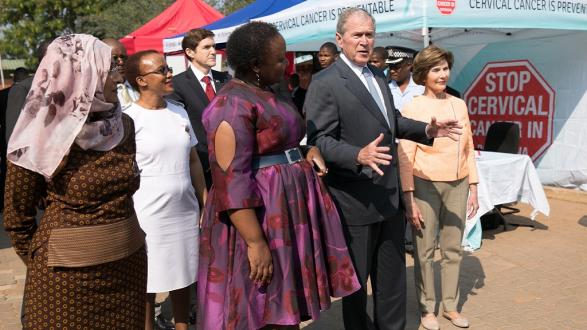The greatest achievement of George W. Bush’s presidency was the creation of the President’s Emergency Plan for AIDS Relief (PEPFAR). Begun in 2003, the program was extended by President Barack Obama. To date it has saved approximately 12 million lives.
But PEPFAR’s future is far from secure. President Trump and his allies in Congress are determined to cut foreign aid programs, using a machete, not a scalpel. When "America first" is the guiding premise for U.S. policymaking, even the most successful programs are vulnerable.
PEPFAR works. As President Bush noted in a recent Washington Post column, "We are on the verge of an AIDS-free generation." Further, PEPFAR programs are addressing AIDS-related diseases such as cervical cancer, to which women with HIV are especially susceptible. One such program is Pink Ribbon Red Ribbon, an initiative of the George W. Bush Institute that works to prevent and treat cervical and breast cancer.
Here are some of PEPFAR’S other accomplishments:
- When PEPFAR began, only 50,000 people in sub-Saharan Africa were receiving antiretroviral treatment. That number is now 11.5 million.
- Nearly 2 million babies have been born free of HIV who otherwise would have been infected.
- Among the secondary victims of AIDS are the orphans of those who died in the epidemic. PEPFAR provides care and support for 6.2 million orphans.
- Last year, more than 74 million people, including more than 11 million pregnant women, received HIV testing and counseling through PEPFAR.
- PEPFAR supported training for nearly 220,000 new health care workers. In addition to responding to AIDS-related issues, this training has enhanced health systems’ responsiveness to outbreaks of Ebola, cholera, and other diseases.
At a time of global consternation about how America views its relationships with the rest of the world, protecting the commitment to PEPFAR is particularly important. The cost for a year of PEPFAR’s work is about $7 billion. That amounts to roughly two-tenths of one percent of the federal budget (which totals about $4 trillion). Given its remarkable record, PEPFAR should be proudly sustained by whoever occupies the White House, but in the current political atmosphere all aid programs are vulnerable to drastic budget cuts or even elimination.
Medical diplomacy is the kind of foreign policy tool that the world’s most powerful nation should embrace.
The behavior of Trump’s administration and Congress is unpredictable, to put it mildly, and so Presidents Bush and Obama should join forces to ensure that PEPFAR continues. If need be, the two former presidents should appear together at the appropriate congressional hearing to support PEPFAR funding. Such a bipartisan gesture—an exceedingly rare occurrence these days—would capture the public’s attention and generate political momentum. PEPFAR would be protected.
Medical diplomacy is the kind of foreign policy tool that the world’s most powerful nation should embrace. Health emergencies can arise suddenly and hit with explosive force, as happened with the 2014 Ebola outbreak. Refugee flows and increased mobility mean that local health crises can rapidly become global. Nations such as the United States that have the financial and logistical ability to respond to these epidemics should accept their moral responsibility to do so.
In the case of the United States, "America first" should not mean "America only." Spending a tiny fraction of this country’s wealth to save lives should be done without a second thought.
The moral and political case for PEPFAR remains strong. Presidents Bush and Obama should rally bipartisan support for the program’s funding, and President Trump should endorse their effort. George W. Bush and the American people can be proud of what PEPFAR has accomplished so far. It deserves the chance to do more.
____________________
Philip Seib is a Pacific Council member and a professor of journalism, public diplomacy, and international relations at the University of Southern California.
The views and opinions expressed here are those of the author and do not necessarily reflect the official policy or position of the Pacific Council.




